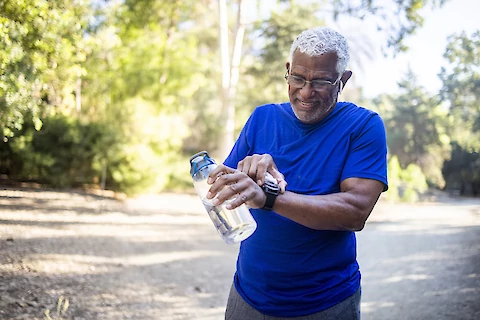
As we age, maintaining good heart health becomes increasingly important. Thanks to technological advancements, it's easier than ever to track our heart's performance. A great example of this helpful technological item is wearable technology. Seniors can greatly benefit from using these devices and make monitoring their heart health easier. In this blog, we’ll explore the advantages of wearable technology for the early detection of potential issues and managing pre-existing heart conditions.
Types of Wearable Technology for Heart Health
A wide variety of wearable technology is available to help you monitor your heart health. From fitness trackers to ECG monitors, these devices have various features designed to provide valuable insights into your heart's performance. Some popular types of wearable technology for heart health include:
Fitness Trackers
These devices count steps, track calories burned, and measure heart rate. With these, they give you an overall picture of your daily activity levels.
Smartwatches
In addition to providing general fitness tracking, many smartwatches come with built-in features like heart rate monitors and ECG functions. They allow you to keep tabs on your heart health at all times.
Heart Rate Monitors
Designed specifically to track your heart rate, these devices can give you real-time insights into how your heart functions during activities or at rest.
Blood Pressure Monitors
Wearable BP monitors make tracking your blood pressure throughout the day easy. They can help you spot trends in your BP and maintain a healthy level.
ECG Monitors
Portable ECG monitors can record your heart's electrical activity. That provides you with valuable data for detecting irregularities or potential issues.
Choosing the Right Device
When it comes to selecting the right wearable technology for your needs, there are a few factors to consider:
- Ease of use — Look for a device with an intuitive interface, clear instructions, and a straightforward setup process.
- Comfort — You'll likely be wearing the device throughout the day. So choose one that feels comfortable on your wrist or body.
- Accuracy — Opt for a device with proven accuracy in measuring heart rate, blood pressure, and other metrics. This helps ensure you're getting reliable data.
- Battery life — Devices with longer battery life will require less frequent charging. It makes them more convenient for continuous monitoring.
- Connectivity — Consider whether you'd like your device to connect with a smartphone or other devices. Connecting your device to your phone can help you to track and analyze your data easily.
Integrating Wearable Technology Into Daily Routines
Incorporate your wearable tech into your daily routine to get the most out of it. You can do this by:
- Setting up the device according to the manufacturer's instructions.
- Wearing the device consistently for accurate tracking.
- Checking your progress and set achievable activity and heart health goals.
Sharing your data with doctors and caregivers can help inform treatment plans and provide valuable insights to identify potential issues. Always seek medical advice if you notice irregularities or have concerns about your heart health.
Need Help Managing Wearable Tech?
Wearable technology offers a convenient and effective way to monitor and manage heart health. For seniors living in Chandler, Gilbert, and Santan, Senior Helpers Chandler-Gilbert is here to help you navigate the world of wearable technology and support your heart health journey. Contact us today for more information on how we can assist you.